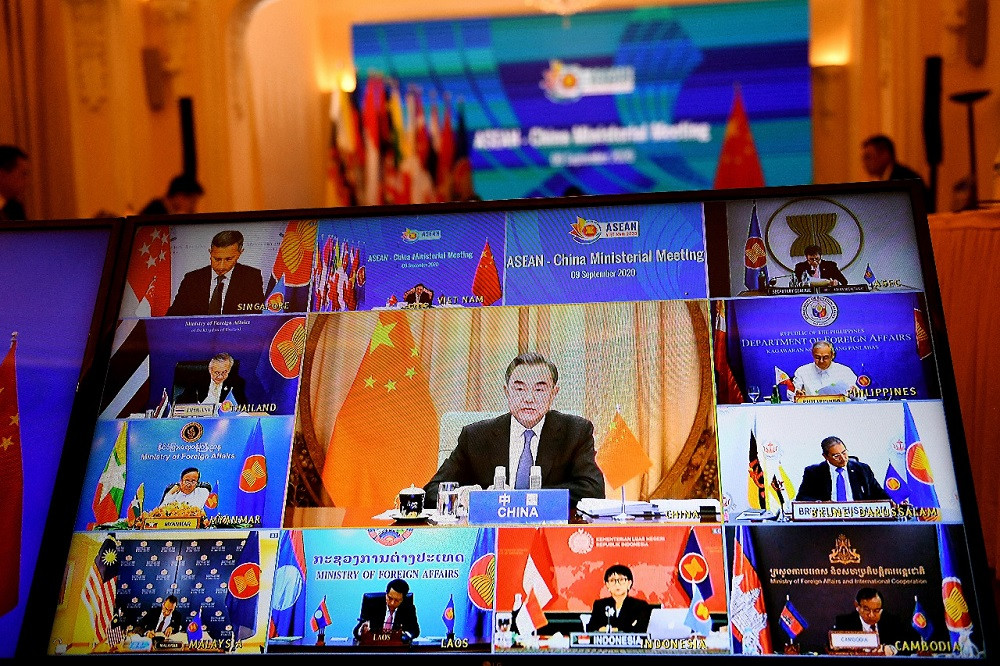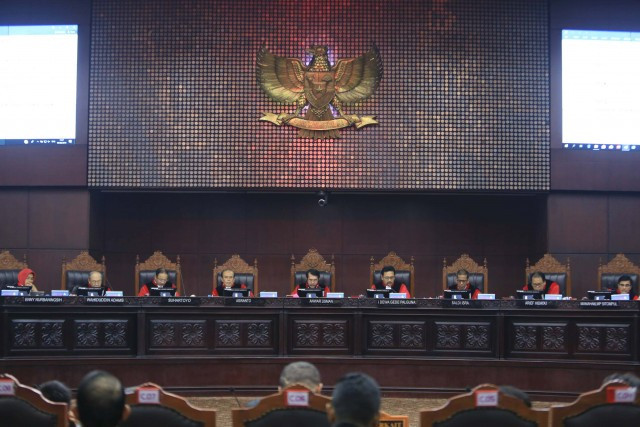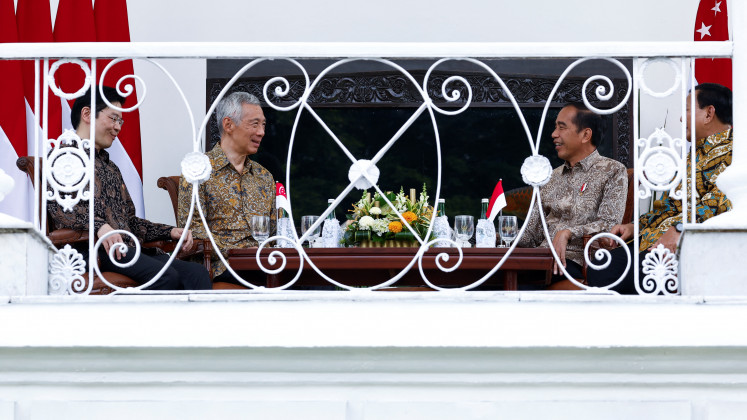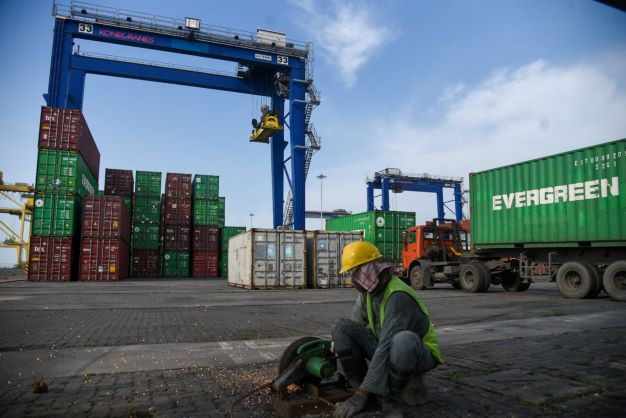ASEAN-China in pursuit of peace and prosperity
It is worth noting that the maintenance of harmony between ASEAN and China should not jeopardize the harmony between ASEAN and other external powers.
Change Size
 Regional partners: China's Foreign Minister Wang Yi (center on screen) addresses counterparts from ASEAN countries in a live video conference during the ASEAN-China Ministerial Meeting held online due to the COVID-19 on Sept. 9, 2021. (AFP/Nhac Nguyen)
Regional partners: China's Foreign Minister Wang Yi (center on screen) addresses counterparts from ASEAN countries in a live video conference during the ASEAN-China Ministerial Meeting held online due to the COVID-19 on Sept. 9, 2021. (AFP/Nhac Nguyen)
A
lthough we share the same planet, we tend to see the environment differently as our perceptions are shaped by our biases. Such diversity can be ascribed not only to the genesis of ideas, but also to how altercations arise.
Luckily, we have various diplomatic methods to address disputes, either through mediation, conciliation or convention. We refer to these as we strive to mitigate the risk of allowing disagreements to get out of hand, and we do it despite our inability to predict every risk because we are relentless in the pursuit of peace and prosperity.
Thus, every element of our world is always subject to variability, and rules are our way of setting patterns. Such variability implies that nothing is perfect in this world because perfection demands timelessness. Some of the ideas produced throughout history are revered as stellar, if not revolutionary, but they are still not perfect.
However, the silver lining is that we are tenacious, persevering and capable enough to achieve something close to perfection, and that is what we call excellence. The ASEAN-China Comprehensive Strategic Partnership (CSP) demonstrates excellence by the brightest of minds united in common goals – unity, prosperity and order. As global tensions continue to escalate and cloud the vision of a united future, the CSP is an attempt at a beacon of hope; one that signals a safer, better and brighter future for everyone.
In maintaining such a relationship, trust is arguably the strongest element that binds its members. Even though the CSP offers a multitude of economic benefits such as China promising to buy ASEAN-originating agricultural products amounting to US$150 billion within a five-year timeframe, and $1.5 billion in assistance for pandemic-related economic recovery within a three-year timeframe, the waning trust in the partnership still remains an issue. The reason being the mere presence of a favorable circumstance does not really offset the existence of a controversial one.
This is particularly evident in the 2020 and 2021 ASEAN-China Survey in which political-security matters were found to be what ASEAN respondents perceived as the least satisfactory. One such matter relates to the standoff in the South China Sea, and despite the Arbitral Tribunal favoring the Philippines on the claim brought by that country against China, the latter remains adamant in increasing its presence over the past few years.
It should be noted, however, that the award is only legally binding on the Philippines and China as it is a bilateral case. Nevertheless, China’s behavior resonates with members as an indication of possible amplification of territorial and maritime disputes, which contributes to the deterioration of trust.
Another prominent challenge is the balancing of self-interests. The members are sovereign states, and while the CSP offers to deepen relations in various areas, it is common for states to go after what best aligns with their interests.
Inherent in this is competition, especially in terms of foreign investments. While China since 2009 has been the largest trading partner of ASEAN, and the latter became the former’s top trading partner in 2020, it is worth noting that the maintenance of harmony between the two parties should not jeopardize the harmony between ASEAN and other external powers.
Still, wherever there are challenges, there are also opportunities. The CSP is an avenue to enhance multilateral relations for the benefit of everyone involved. Incidentally, this also gives ASEAN the opportunity to have a concentrated voice in presenting stronger stances toward pressing issues that can lead to the resolution of ongoing negotiations, especially regarding the dispute in the South China Sea.
Strengthening the implementation of the CSP would mean going beyond the echo chambers of the elites. After all, it is not only businessmen or those in seats of power that will be affected. Ultimately, it also affects those who are worried about the increasing prices of commodities, the concerned farmers thinking about to whom they are going to sell their excess crops, and the parents who desire a better quality of education for their children.
As the youth are the leaders of tomorrow, involving and mobilizing youth groups can help bring the discussion to the masses and offer fresh perspectives. Given that collectivism is highly ingrained in our culture, introducing new ideologies and convincing people may take some time, but as these groups continue to engage in dialogue with different sectors, there is a higher chance for people to change their perceptions. Once they become more accepting, it is also this very same harmony that will drive nations to allocate more resources for a collective goal.
Lastly, decoupling of issues can also help strengthen its implementation. As much as possible, settling disputes should not require a halt to the entire system. To put it into perspective, each area covered by the CSP may be viewed as a separate mechanism, and those that operate well must remain in effect while those mechanisms that need tinkering are the only ones that need to be temporarily halted.
Equally important is the pacing of how these mechanisms are tinkered with as external powers also react to how the system moves in its entirety. In this manner, it allows efficiency while also giving room for reassessment of plans.
In spite of challenges and unsettled issues, these do not debase the significance of the CSP. One must also steer away from looking at it through rose-tinted glasses. To reiterate, it is not perfect, because nothing is. While we cannot exactly determine what happens in the future, one thing is now certain: the existence of the CSP is a manifestation of each nation’s desire to build a shared lexicon.
If nations continue on building toward trust and transparency, the partnership will not be long in becoming one of the pillars of world peace.
***
The writer is a fourth-year student of Malayan Colleges Laguna, Philippines.










